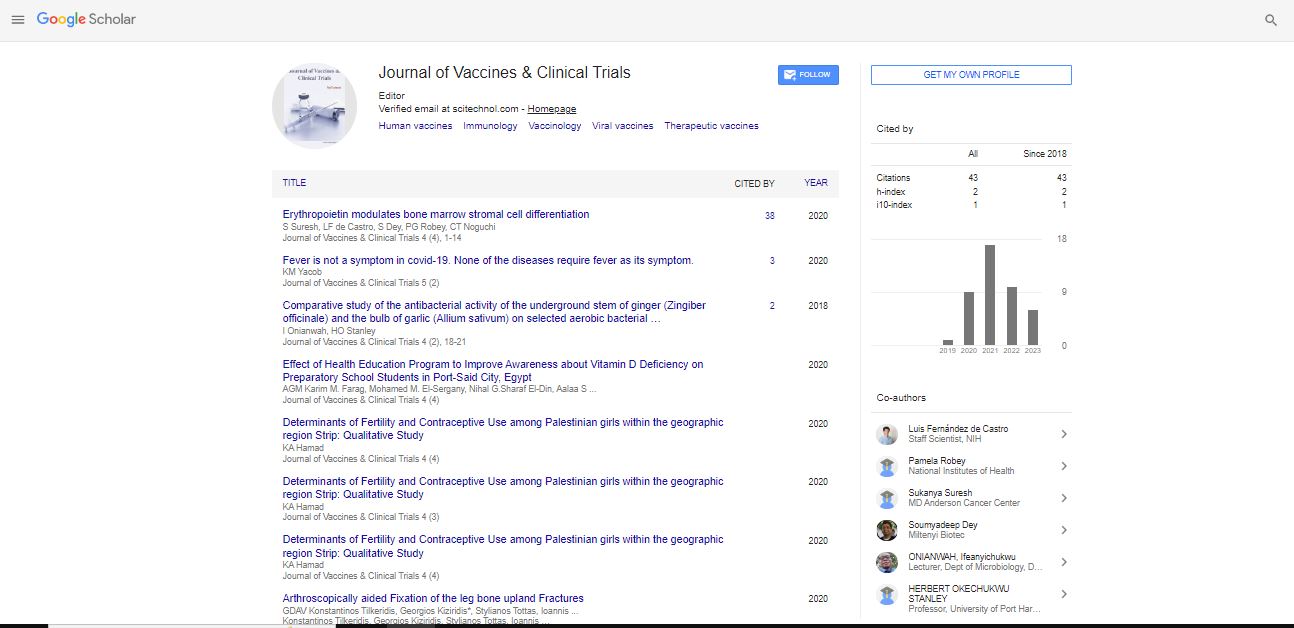Commentary, Jou Of Vac Cli Tr Vol: 7 Issue: 4
Epidemiology and Global Impact of Dengue: Clinical Presentation and Disease Progression
Rakesh Tiwari*
1Department of Medicine, University of Kalyani, Kalyani, India
*Corresponding Author: Rakesh Tiwari,
Department of Medicine, University of
Kalyani, Kalyani, India
E-mail: tiwaritiwari@yahoo.co.in
Received date: 27 November, 2023, Manuscript No. JVCT-24-128357;
Editor assigned date: 30 November, 2023, Pre QC No. JVCT-24-128357 (PQ);
Reviewed date: 07 December, 2023, QC No. JVCT-24-128357;
Revised date: 21 December, 2023, Manuscript No. JVCT-24-128357 (R);
Published date: 28 December, 2023 DOI: 10.4172/JVCT.100087
Citation: Tiwari R (2023) Epidemiology and Global Impact of Dengue: Clinical Presentation and Disease Progression. Jou of Vac Cli Tr 7:4.
Description
Dengue fever, a mosquito-borne viral infection, has emerged as a significant public health concern in tropical and subtropical regions worldwide. The disease, caused by the Dengue Virus (DENV), is primarily transmitted to humans through the bite of the Aedes aegypti and, to a lesser extent, Aedes albopictus mosquitoes. These mosquitoes are most active during daylight hours, increasing the risk of transmission.
The incidence of dengue has risen dramatically in recent decades, making it one of the fastest-growing infectious diseases globally. It is estimated that around half of the world's population is at risk of dengue infection, with an estimated 390 million cases occurring annually. Regions with high endemicity include Southeast Asia, the Western Pacific, Africa, and the Americas, with periodic outbreaks affecting millions.
Dengue fever typically manifests as a flu-like illness with symptoms ranging from mild to severe. Common signs include sudden onset of fever, severe headaches, muscle and joint pain, nausea, vomiting, and a rash. In some cases, the disease can progress to a severe and potentially fatal form known as severe dengue or Dengue Hemorrhagic Fever (DHF).
Severe dengue is characterized by plasma leakage, severe bleeding, and organ impairment. Without prompt medical intervention, it can lead to shock, organ failure, and death. Factors contributing to the severity of the disease include the individual's immune response and the presence of specific dengue virus serotypes.
Diagnosing dengue can be challenging due to its similarities with other febrile illnesses. Laboratory tests, including serological and molecular diagnostics, are used to confirm the infection. There is no specific antiviral treatment for dengue, so management focuses on supportive care, such as hydration, pain relief, and close monitoring of vital signs.
However, early detection and access to proper medical care significantly reduce the risk of complications and mortality associated with severe dengue. Research into antiviral drugs and vaccines continues to address the need for specific therapeutic interventions.
Given the absence of a specific treatment or widely available vaccine, prevention remains the cornerstone of dengue control. Strategies include vector control measures, such as eliminating breeding sites for mosquitoes by reducing standing water, using insecticides, and implementing community-based approaches to reduce mosquito populations.
Public health education and community engagement play vital roles in raising awareness about dengue prevention. People living in or traveling to endemic areas should take precautions, such as using mosquito repellents, wearing protective clothing, and sleeping under bed nets.
Several challenges hinder the effective control of dengue. These include the rapid urbanization leading to increased human-mosquito contact, climate change influencing mosquito habitats, and the lack of effective surveillance and healthcare infrastructure in some regions.
Efforts to develop vaccines against dengue have faced obstacles, including the complexity of the virus and the need to address the risk of severe disease caused by specific serotypes. However, advancements in vaccine development offer hope for effective preventive measures.
Dengue fever remains a significant global health challenge, causing substantial morbidity and mortality worldwide. Addressing this threat requires a multi-faceted approach involving robust surveillance, improved healthcare infrastructure, community engagement, and ongoing research to develop effective vaccines and therapeutics. Only through collaborative efforts can we hope to mitigate the impact of this disease and protect vulnerable populations from its devastating effects.
 Spanish
Spanish  Chinese
Chinese  Russian
Russian  German
German  French
French  Japanese
Japanese  Portuguese
Portuguese  Hindi
Hindi 